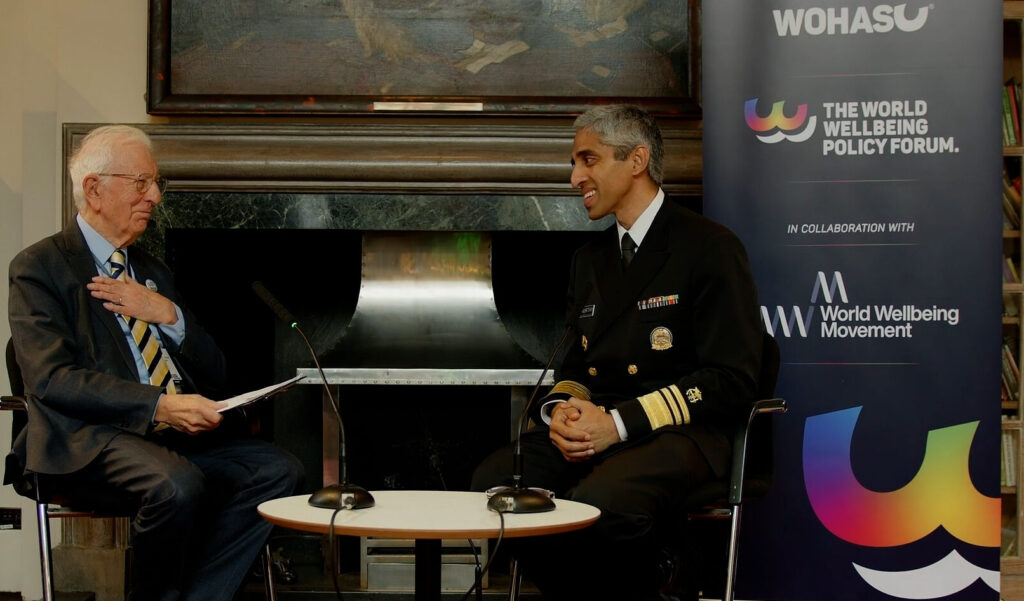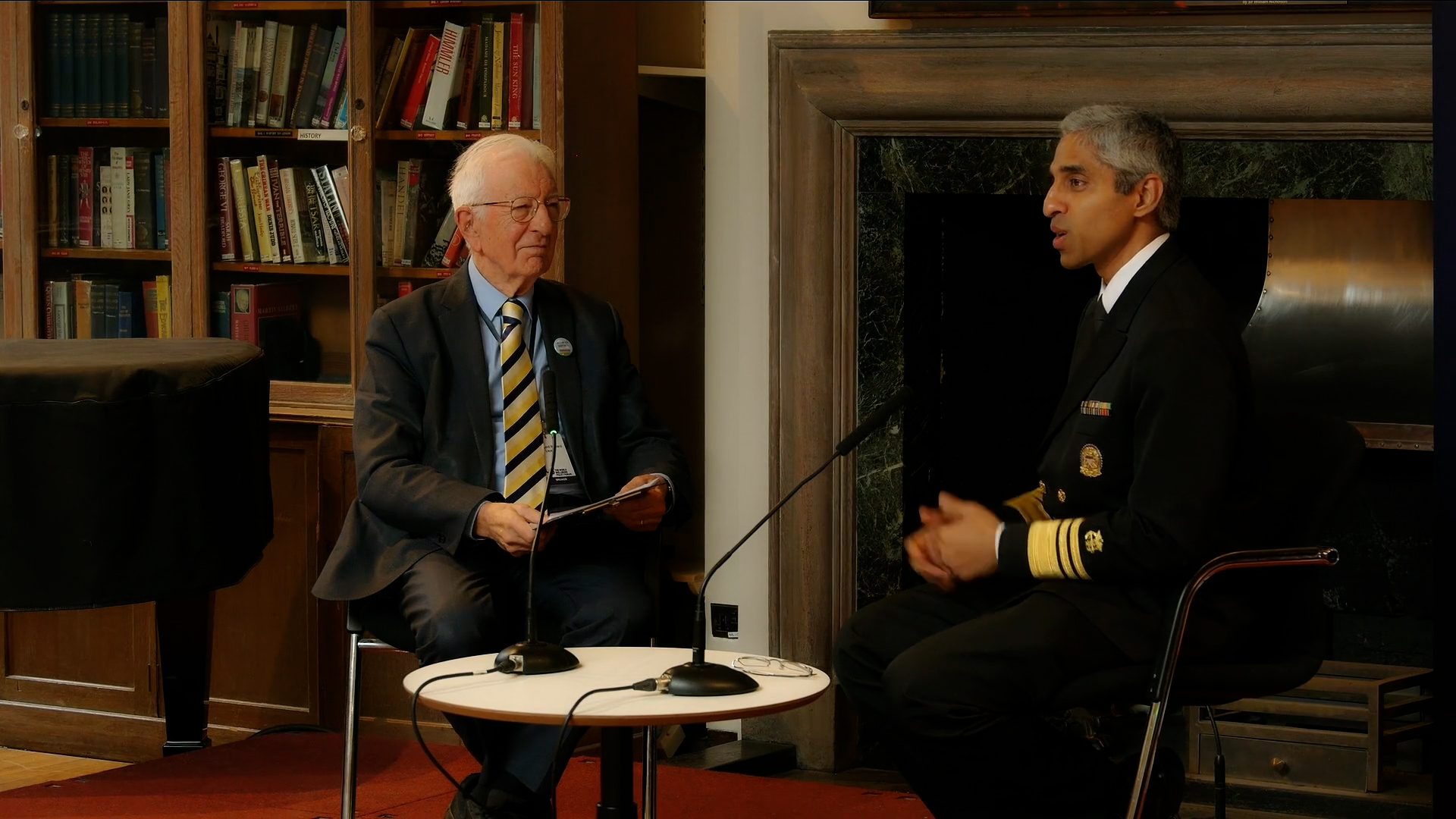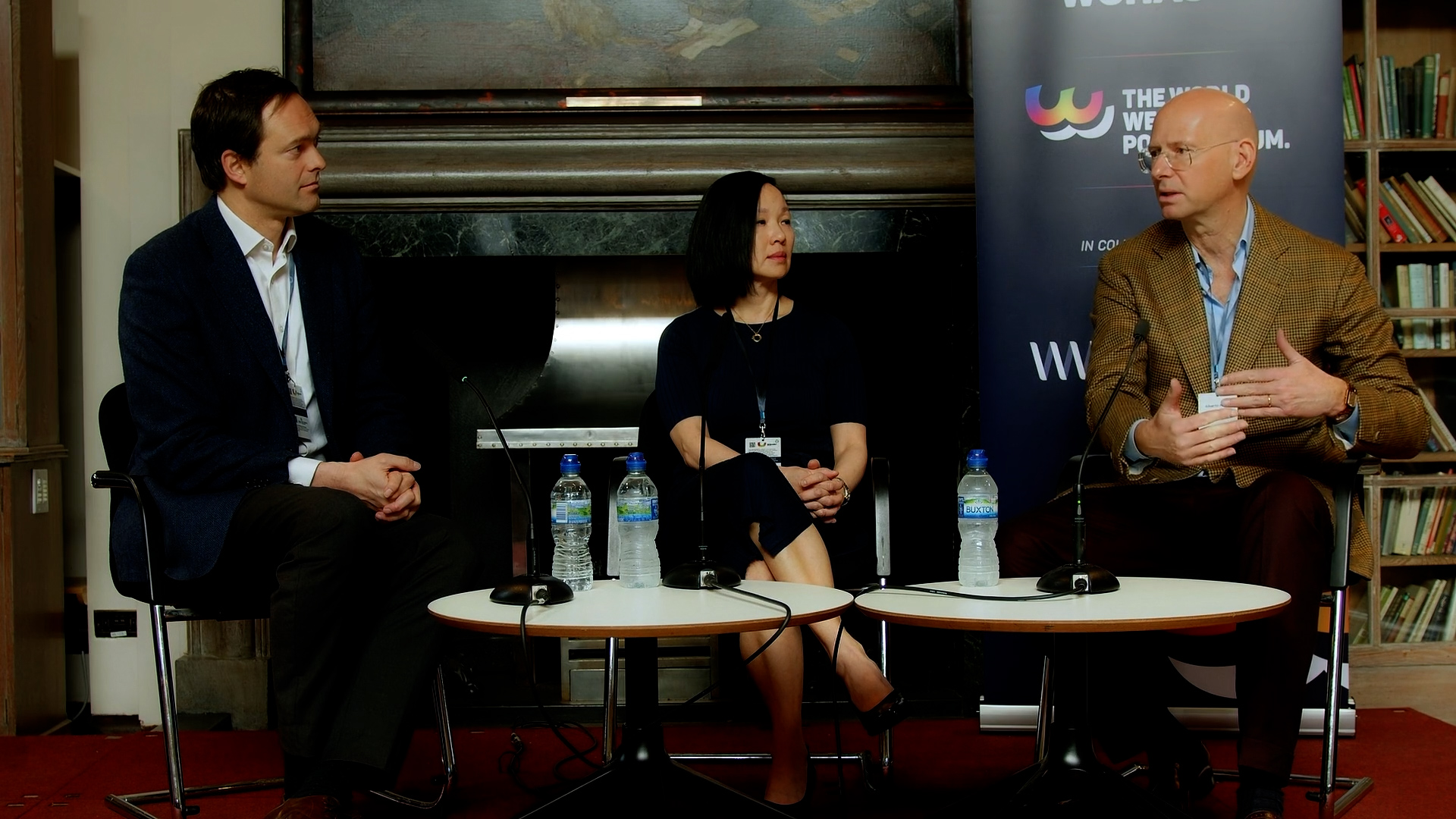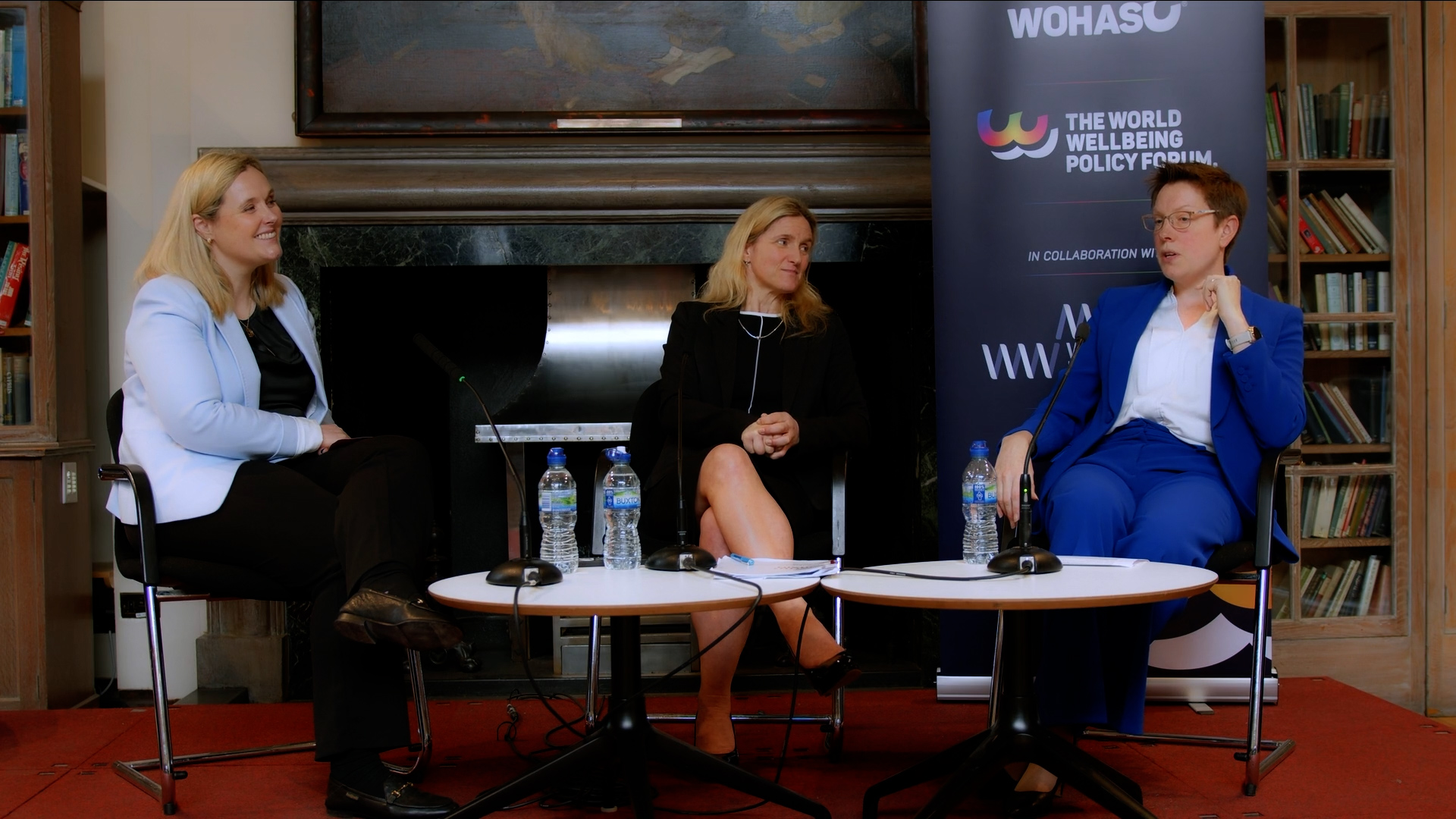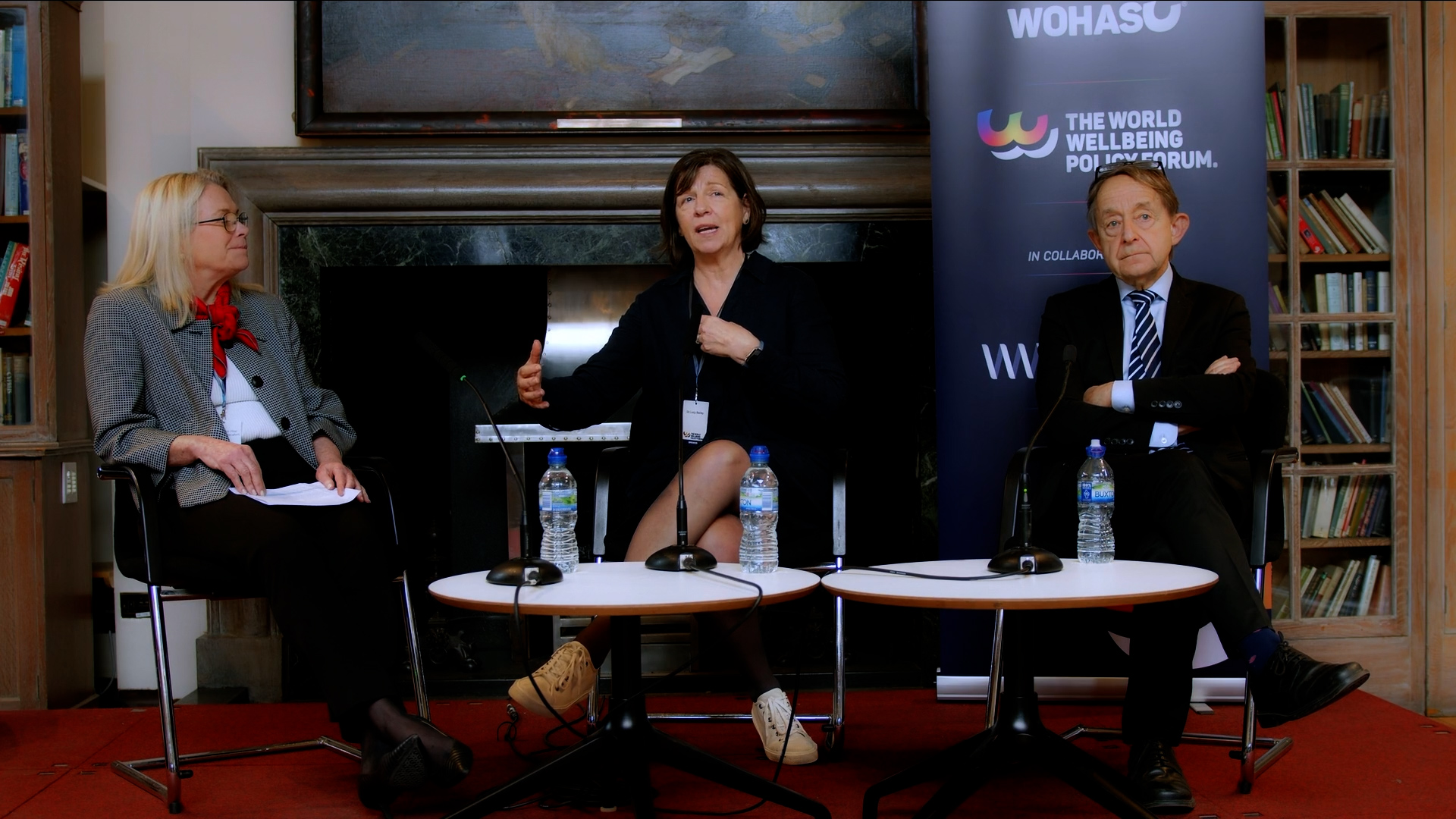28.05.2024 | 6 min read
World Wellbeing Policy Forum 2024
Insights from a pivotal gathering of distinguished academics, government policymakers, activists, and business leaders dedicated to shaping global wellbeing policies.Charlotte Day
The World Wellbeing Policy Forum, organised by WOHASU® in collaboration with the World Wellbeing Movement, explored wellbeing and the cost of unhappiness in business, education, politics and government.
On Monday 18th March 2024, a series of distinguished speakers took to the stage in the historic Shaw Library at the London School of Economics and Political Science (LSE) to speak with a room of business leaders, policy makers, dignitaries and academics from across the globe. The Forum aimed to promote an international dialogue for the exchange of global strategies, insights and empirical evidence on how to improve population wellbeing.
The World Wellbeing Movement (WWM) were honoured to collaborate with WOHASU® on bringing this event to life. The Forum took place the day before the two-day World Happiness Summit in London, organised by WOHASU®.
WOHASU® founder and CEO, and valued WWM Board member, Karen Guggenheim opened proceedings with an inspiring keynote highlighting both the importance of promoting wellbeing at scale, and underscoring the significance of this newly established Forum as a crucial step towards achieving that goal.
Karen Guggenheim opening the World Wellbeing Policy Forum at the London School of Economics.
Next up, World Wellbeing Movement co-founder, Prof Lord Richard Layard hosted an engaging fireside chat with 19th and 21st US Surgeon General, Dr Vivek Murthy. While serving as US Surgeon General, Dr. Murthy has made addressing loneliness and social disconnection a priority for improving population wellbeing. He explained why with some stark research findings: “The risk of increased mortality that we were seeing with social disconnection was comparable to the risk of mortality with smoking, it was even greater than the mortality risk that we were seeing with obesity, and with sedentary living”.
The risk of increased mortality that we were seeing with social disconnection was comparable to the risk of mortality with smoking
Dr Vivek Murthy talks to Prof Lord Richard Layard about the cost of loneliness to wellbeing at the World Wellbeing Policy Forum 2024.
Government has a unique role that it can play in highlighting and drawing attention to issues as ones of national and global priority
Dr Murthy seized the moment to issue a call to action, stating, “To really address an issue like loneliness, this is something that all of us have to engage on. And that means private sector, businesses, and schools. It means individuals, and it means governments too.”
As Surgeon General of the United States, Dr Murthy is the leading advisor and spokesperson on matters of public health in the US government, so it was encouraging to hear him emphasise the importance of prioritising people’s wellbeing in government decisions: “Government has a unique role that it can play in highlighting and drawing attention to issues as ones of national and global priority. Thinking about how social connection is impacted by policy, and how to shape policy to enhance social connection is really vital”.
The morning continued with the ‘Role of Business’ panel with Dr Diana Han, Chief Health and Wellbeing Officer at Unilever, and Alberto Nobis, CEO VTG GmbH – moderated by World Wellbeing Movement co-founder Prof Jan-Emmanuel De Neve. Dr Han and Alberto both shared actionable tips that their respective businesses have implemented to help drive a people and wellbeing centric approach.
Prof Jan-Emmanuel De Neve, Dr Diana Han and Alberto Nobis in conversation on stage at the World Wellbeing Policy Forum 2024.
Businesses have a profound role to play in advancing the broader cause of happiness and wellbeing for society
Dr Han reiterated the opinion of many experts in the room, saying that, “Businesses have a profound role to play in advancing the broader cause of happiness and wellbeing for society”. Diana provided a refreshing take on how large organisations can promote wellbeing at scale, drawing on her experience helping to lead a global team of well over 100,000 employees, all with their own unique wellbeing needs.
Alberto stressed the value of listening to your employees, “Just like we ask customers what they want, we should ask employees what they want, and listen”. The panel agreed that providing regular, and sometimes even impromptu opportunities for your employees to provide feedback, and truly listening to their reported experiences, is vital in increasing workplace wellbeing.
Just like we ask customers what they want, we should ask employees what they want, and listen
Dr Diana Han and Prof Jan-Emmanuel De Neve discussed the Work Wellbeing Playbook, recently published by the World Wellbeing Movement, in collaboration with Indeed. The experts pointed business leaders in the room to this open-access resource which is designed to guide employers in crafting holistic work wellbeing strategies within their organisations. Dr Han confirmed that the interventions included in the playbook, distilled from over 3,000 academic studies, are, “ones that we have seen, over the years, be quite evergreen in the evidence base”.
Then it was time for the Role of Politics panel, moderated by our Managing Director, Sarah Cunningham. Two current UK Members of Parliament, Kim Leadbeater MP (Labour) and Dame Tracey Crouch MP (Conservative) took to the stage. Tracey, who was the world’s first Minister for Loneliness, built on Dr. Vivek Murthy’s insights, and shared some learnings from her time in that important role. Kim, who has recently published a new report called ‘Healthy Britain: A new approach to health and wellbeing policy’, outlined some recommendations from that report aimed at fostering wellbeing in society.
The Role of Politics conversation at the World Wellbeing Policy Forum 2024. Pictured on stage: Sarah Cunningham, Kim Leadbeater MP and Dame Tracey Crouch MP.
The discussion reflected on the progress made in the UK so far, notably highlighting the crucial task of measuring population wellbeing – a practice that has been undertaken by the UK’s Office for National Statistics (ONS) for over a decade. Measurement was highlighted as a significant step that all countries should undertake, as the foundation for wellbeing public policy. The conversation then focused on what the next steps should be to make a real difference to improving the quality of life of people across the UK, as well as discussing what the UK can learn from other countries’ approaches. It was encouraging to witness politicians from diverse political backgrounds align on the importance of putting wellbeing first in public policy, and on the need to assess all policy decisions with a wellbeing lens.
Tracey and Kim, who sit on a number of All Party Parliamentary Groups (APPGs) together, highlighted the importance of cross-party collaboration to achieving positive change. Tracey explained, “We got together and formed the All-Party Parliamentary Group on Loneliness and Connected Communities, and have continued to talk around the world on the issue of loneliness together”. Kim later stated, “It’s the only way I will ever work. You find the subject that you care about, then you find your allies. Sometimes they are in your political party, and sometimes they are in other political parties.”
You find the subject that you care about, then you find your allies. Sometimes they are in your political party, and sometimes they are in other political parties
Whilst both Tracey and Kim advocate strongly for policy change that puts wellbeing first, they reminded audience members that there is something everyone can be doing for themselves and those around them. “The good thing about the problem [of wellbeing, social connection and loneliness] is everybody can do something about it”, said Kim. Tracey added, “There is no one cause for loneliness, so therefore there is no one solution”.
There is no one cause for loneliness, so therefore there is no one solution
The morning closed with a panel on the Role of Education, moderated by Former Ambassador of Costa Rica, Pilar Saborio de Rocafort. Lucy Bailey, CEO and Founder of Bounce Forward, and Sir Anthony Seldon, President of IPEN (International Positive Education Network), explored evidence-based skills and strategies to strengthen resilience and wellbeing in children, and discussed some of the unique struggles facing today’s younger generations.
Ambassador Pilar Saborio de Rocafort, Sir Anthony Seldon, and Lucy Bailey on stage at the World Wellbeing Policy Forum 2024 in the Shaw Library at the London School of Economics.
The panel challenged the idea that educating and prioritising wellbeing in schools would come at the expense of academic performance. “We need to work together to have a more equitable, fairer society. We need to implant wellbeing and happiness”, commented Sir Anthony, later adding that, “There is no conflict between performance and wellbeing. Wellbeing is the necessary sister and brother of performance”.
There is no conflict between performance and wellbeing – wellbeing is the necessary sister and brother of performance
Lucy posed the question, “How on earth can children learn how to be in the world unless they are able to talk to different people and to explore the sense of who they are as individuals?”. She explained the difficulty that BounceForward have had in rolling out positive education and wellbeing centred sessions into UK schools and the frustrations that come with that barrier. Reflecting the appetite for change within the room, she suggested that, “Putting wellbeing at the heart of education policy has to be something that the next government takes on”.
This final session ended the morning on a promising note, with Lucy sharing that the inaugural World Wellbeing Policy Forum felt like, “a moment in time”. The audience then broke out into a networking lunch, where there was a buzz of optimism and the sharing of ideas for a future where wellbeing is put first.
It feels like a moment in time
To watch the conversations from the day, simply click on the corresponding images above, or view the whole playlist by clicking the button below!

